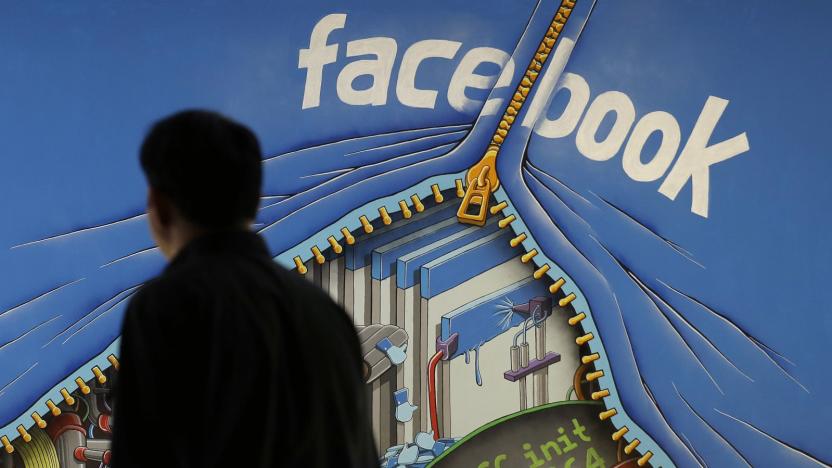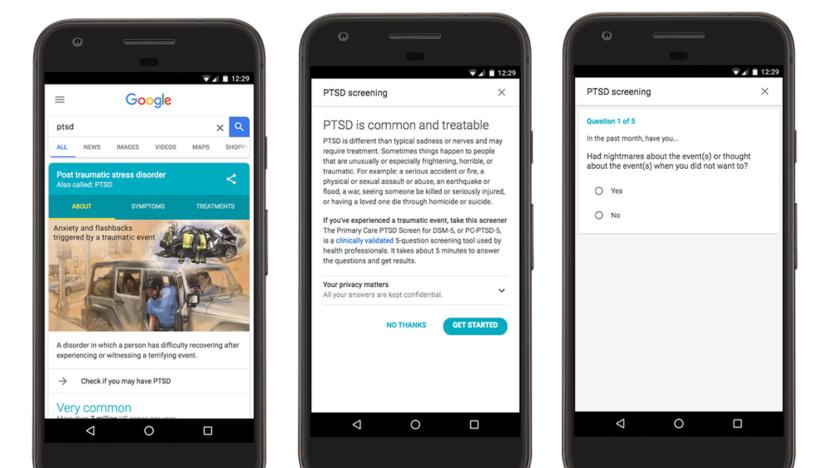PTSD
Latest

Ex-TikTok moderators sue over 'emotional distress' from disturbing videos
The women saw videos of murder, bestiality and other distressing images.
Amrita Khalid03.24.2022
FDA clears Apple Watch app that helps treat PTSD-related nightmares
The FDA has approved sale of an Apple Watch app, NightWare, that helps sleep for people with PTSD-related nightmares.
Jon Fingas11.08.2020
Looxid adapts its VR brain monitor for Oculus Rift S
Two years ago, Looxid Labs walked Engadget through a VR museum. A virtual display was pinned to the corner of the user's field of vision and contained real-time stats on his brain activity. At the time, the product seemed a little out-there, but it has matured considerably, and has some clear applications not just in the world of VR gaming, but also in business and health industries. The company revealed that the Looxid Link now works with Oculus Rift S using an EEG-equipped attachment -- and for an add-on, it looks surprisingly slick.
Marc DeAngelis03.13.2020
Recommended Reading: Facebook moderator PTSD
Bodies in seats Casey Newton, The Verge The job of moderating toxic content on social media is a daunting task. It also takes a massive psychological toll on those doing it. The Verge has first-hand accounts from the worst-performing Facebook moderating site in North America. People who worked there describe dire working conditions, harassment and their struggles with PTSD.
Billy Steele06.23.2019
Google search quiz can help diagnose PTSD
Google is continuing its efforts to help you improve your mental health. Search for "posttraumatic stress disorder" or related keywords on your phone and you'll now have the option of taking a clinically validated questionnaire that can screen for signs of PTSD. This won't provide a definitive answer (Google stresses the importance of an in-person diagnosis), but it can give you useful knowledge to take to your doctor.
Jon Fingas12.05.2017
FDA approves new trials using MDMA to help treat PTSD
MDMA, the pure form of Ecstasy, is usually only mentioned when partygoers get busted for holding the Schedule 1 restricted drug. But medical researchers have been quietly testing its potential medical applications, like treating terminally ill patients and assisting patient therapy for PTSD. The results from the latter have been promising enough for the FDA to commission Phase 3 trials, which is the last step before MDMA's possible approval as a prescription drug.
David Lumb11.29.2016
Virtual reality could help fight depression
A study by University College London (UCL) and the Catalan Institution for Research and Advanced Studies (ICREA) suggests virtual reality could be utilized as a treatment for depression in the future. The pilot study worked with 15 depression patients aged 23 to 61, yielded positive results in 60 percent of subjects.
Aaron Souppouris02.17.2016
Video games are pretty lazy in their portrayal of PTSD
It's reported that one in three troops returning home from war are being diagnosed with post-traumatic stress symptoms. If you look at video games, those numbers are probably exponentially higher considering the events characters endure while saving the (virtual) world. But games aren't exactly known for being particularly subtle, and that's what the latest episode of Low Batteries from Eurogamer is all about. The clip examines Metal Gear Solid V: The Phantom Pain, Spec Ops: The Line, Deus Ex: Human Revolution and a few others. The findings? Sadly, games use PTSD as short-hand to fill in character backstory or motivations and sometimes are pretty lazy about it.
Timothy J. Seppala10.30.2015
Obama's 2013 'BRAIN' initiative results in remote-controlled mice
The first results to stem from President Barack Obama's 2013 "Brain Research through Advancing Innovative Neurotechnologies" initiative are in, Reuters reports. As noted in the journal Neuron, scientists were able to manipulate the brain circuitry of lab mice, making them move, stay still, eat or leave their bowls of food behind. This was accomplished through the use of DREADDs, "designer receptors exclusively activated by designer drugs." The DREADDs system uses genetically engineered brain neurons to create custom receptors that lock into manmade molecules, activating whichever neuron scientists target. The DREADD method is a noninvasive form of behavior control, first introduced about a decade ago as a way to turn neurons on or off -- the newest DREADDs are the first to be able to do both.
Jessica Conditt04.30.2015
DEA approves MDMA study for the terminally ill
MDMA is widely used both on and off festival grounds. But the drug is quietly making a comeback as a therapeutic aid. Last week, the DEA approved a clinical trial that will use a combination of the psychedelic drug and psychotherapy to treat anxiety associated with terminal illnesses. Multidisciplinary Association for Psychedelic Studies (MAPS) has initiated the study as part of their on-going efforts to validate the effectiveness of MDMA in a scientific setting. This isn't the first time it's been used to assist psychotherapy. But if the study is successful, it will introduce a new use for the drug.
Mona Lalwani03.20.2015
Virtual reality can't cause PTSD, but it can treat it
Usually when we talk about virtual reality on Engadget, we talk about it in terms of entertainment, but it's important to remember that the technology can be much more than a mere toy. It's ability to substitute reality for any imaginable experience has been shown to have real, measurable effects on people, to the extent that one developer used it to cure his own diplopia. Popular Science magazine is now asking if the experience is real enough to inflict post-traumatic stress disorder on VR gamers. The short answer is no, probably not -- but virtual reality technology has been used to help treat the disorder.
Sean Buckley10.07.2014
US researching implants that'll help your body and mind heal itself
America's mad science division is at it again, this time imagining a future where your body won't need (as much) medicine to stay healthy, simply by using the resources it already has. Put simply, a person's peripheral nervous system runs the internal organs and summons the troops to fight off infections and repair injuries. DARPA's just received $78.9 million of funding to look into harnessing this system to develop a miniscule implant that'd not only make people healthier and less prone to disease, but could also be used to treat mental health complaints like post traumatic stress disorder in the future.
Daniel Cooper08.29.2014
The US military wants brain implants to treat combat trauma
For soldiers coping with brain injuries and post-traumatic stress, coming home may be tougher than the actual fighting; their conditions can last a lifetime. Long-term relief may be on the horizon for US veterans, though. DARPA is supporting the White House's brain mapping initiative by funding the development of implants (conceptualized below) that alleviate the symptoms of warriors' mental problems, ranging from PTSD to extreme depression. The technology, built by Massachusetts General Hospital, Draper Laboratory and UC San Francisco, will use sensors to watch for unusual neural activity at multiple parts of the brain. If something's wrong, the implants will use deep electrical stimulation to restore healthy activity -- permanently, if possible.
Jon Fingas05.27.2014
Electric shocks could hold the key to manipulating dreams
Ever wanted to have more control over your dreams? A new study into how electricity affects the brain is enabling scientists to influence the way people sleep, giving hope that it could one day be used to improve the quality of your night's rest. By stimulating the frontal and temporal positions on volunteers' scalps, all of whom had never experienced lucid dreaming before, scientists were able to change the neural activity in their brains, bringing them towards a more "awake-like" state that could possibly allow them to control the outcome of their dreams.
Matt Brian05.12.2014
US Navy taps iPad to help with PTSD
The Office of Naval Research (ONR) in conjunction with the Defense Advanced Research Projects Agency (DARPA) is sponsoring development of an iPad app designed to teach US sailors and marines to understand their responses to stress and manage me them using biofeedback techniques. The system will be tested at the Naval Center for Combat and Operational Stress Control in San Diego next month. Using only an iPad and a heart rate monitor clipped to an earlobe, the person using the setup will play some games specially designed to help personnel learn to reduce stress. It's hoped that the training will reduce the incidence of Post Traumatic Stress Disorder and help service members cope with the challenges of deployment. An article in Medical Xpress says the program is based on applying past research teaching warfighters stress management techniques. Figures provided by the miliatary say about 21 percent of miltary personnel returning from Iraq and Afghanistan suffer from PTSD, which in turn leads to costs of more than a billion dollars in lost productivity and treatment expenses.
Mel Martin03.10.2013
SnowWorld breathes new life into severely burned Afghanistan veteran
We know video games can offer deeply immersive experiences that affect our real-world emotions and draw intense reactions from our real-life bodies and minds. We know this, and finally the professional medical community is beginning to recognize our insight, with truly encouraging results, as described by GQ's recent feature, Burning Man.Sam Brown's body was burned horrifically during his tour in Afghanistan, after his Humvee ran over an IED, GQ writes. He spent many months after the accident drugged out of consciousness on rave-grade hallucinogens and enduring the highest levels of physiological pain during therapy that no amount of morpihne could tame. And then a cognitive psychologist told him to play SnowWorld, a virtual-reality game full of snowball-chucking snowmen and penguins, while his skin was stretched, a procedure that normally garnered a score over 10 on Brown's pain scale.Playing SnowWorld, he gave the pain a six.Hunter Hoffman, the psychologist behind SnowWorld, is working on further research into the art of pain distraction through video games, but already results such as Brown's show great potential. Hoffman is using $7.5 million in grants from the National Institutes of Health to expand his research, including the incorporation of Second Life-style elements into video game therapy. Read the entire, captivating story at GQ. [Image via MGShelton]
Jessica Conditt01.31.2012
U.S. Army urges vets to get outta their dreams and into the virtual world
You've heard of power walking, but "power dreaming?" That practice's usually the stuff of Buddhism, and now, could go a long way towards mending the psychic wounds of our nation's bravest. With about 52% of PTSD-affected veterans reported as having disturbing nightmares, the U.S. Army's working towards a virtual solution that'd marry the design of Second Life with laptop-displayed or 3D head-mounted, physio-emotional healing. The project, a form of biofeedback therapy which would create custom, stress-alleviating imagery for traumatized vets, is currently in the planning stage with Washington State's Naval Hospital serving as its experimental base. Over half a million in funding's already been put towards the effort which is expected to launch in full next year. And when it does, we're hoping the tech resembles a certain Strange Days SQUID recorder -- with happy thoughts, o'course.
Joseph Volpe10.22.2011
Artist to lock self in crate with no contact with outside world but Lord of the Rings Online
Have you ever wondered what it would be like to be locked in a crate with absolutely no contact with the outside world except through an online game? No? Well, neither have we. Artist Jordan Long, however, apparently has, and for his first solo show he intends to ship himself in a crate from Bald Knob, AK to Portland, OR with Lord of the Rings Online as his only contact with the outside world. You may be asking yourself, "What exactly is the purpose of this little stunt?" A fair question. According to Mr. Long, the focus of his art is the study of trauma and Post Traumatic Stress Disorder, and he claims that many who are confined to their homes due to such trauma tend to find their escape in the form of online games such as LotRO, where they can "enter and exit whenever they choose, be whoever they want to be and feel like functioning members of society again." It's an interesting concept, to say the least. If you want to follow Jordan's project, you can keep an eye on his official site.
Matt Daniel06.20.2011
In small doses: Tetris is a PTSD 'vaccine,' prevents flashbacks, study finds
Believe it or not, the image above is not some ten-year-old's 5th grade collage. It's real science, by the fine chaps in the department of psychiatry at the University of Oxford. The study sat individuals in front of a 12-minute clip of "traumatic scenes of injury and death" (we're not talking Mario falling into a pit here), gave them a 30-minute break, and then split them into two groups. One group was asked to sit in silence. The other played Tetris for ten minutes.The study found that those who played Tetris had significantly fewer flashbacks of the gruesome video in the days that followed, according to mandatory diaries kept by the participants. The results suggest that Tetris acts as a "cognitive vaccine" against the effects of Post-Traumatic Stress Disorder (PTSD), which correlates with contemporary treatments that call for the use of visual "distractions" to treat reoccurring mental trauma. But much like Heroin before it, Tetris may end up being the cure that needs to be cured. In other words: Use only as directed.[Via guardian.co.uk]
James Ransom-Wiley01.07.2009